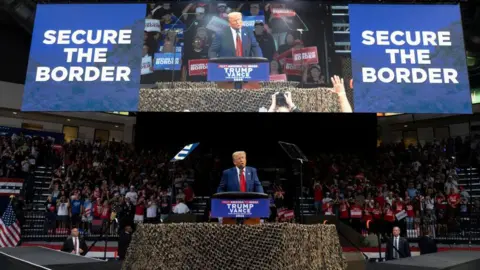
Trump Blasts Senator Van Hollen as "Grandstander" Over El Salvador Mission to Meet Deported Maryland Resident
Trump Escalates Criticism of Van Hollen's El Salvador Mission as Deportation Case Tests Administration
Presidential Rebuke Intensifies Political Battle Over Contentious Maryland Deportee Meeting
President Donald Trump launched a scathing attack against Senator Chris Van Hollen today, deriding the Maryland Democrat's high-profile diplomatic mission to El Salvador as a desperate publicity stunt.

"Senator Chris Van Hollen of Maryland looked like a fool yesterday standing in El Salvador begging for attention from the Fake News Media, or anyone. GRANDSTANDER," Trump declared on his Truth Social platform, capitalizing the final word for emphasis.
The presidential broadside comes amid an escalating diplomatic and legal standoff over Kilmar Abrego Garcia, a Maryland resident whose controversial deportation has triggered a constitutional power struggle between the judicial branch, the Trump administration, and the Salvadoran government.
A Deportation Under Dispute
The controversy centers on Garcia, who was deported to El Salvador last month under circumstances that remain heavily contested. The Trump administration initially acknowledged in court filings that Garcia's removal was an administrative error. However, administration officials later pivoted, asserting that Garcia had gang affiliations that justified his deportation – a claim his legal representatives vehemently deny.
"We've seen this pattern repeatedly – a deportation occurs without proper legal process, followed by post-hoc justifications," said a human rights attorney who specializes in immigration cases. "The courts have been clear about the requirements for due process."
Due process in US immigration law refers to the constitutional guarantee, rooted in the 5th and 14th Amendments, that ensures fundamental fairness in legal proceedings. This means non-citizens facing actions like deportation are generally entitled to certain procedural protections, such as notice of charges and an opportunity to be heard before an immigration judge.
Both a federal district court and subsequently the U.S. Supreme Court have issued orders directing the Trump administration to facilitate Garcia's return to American soil for proper deportation proceedings. These judicial directives have created an unprecedented diplomatic impasse, as Salvadoran President Nayib Bukele has refused to relinquish custody of Garcia, asserting sovereign authority over what he characterizes as a Salvadoran criminal matter.

Restaurant Diplomacy
Van Hollen's journey to El Salvador began with frustration. The Senator was initially denied access to the high-security prison where Garcia was reportedly being held. After diplomatic negotiations, a compromise emerged – Van Hollen would meet Garcia, but in a controlled setting away from the prison facility.

The meeting ultimately took place at what sources described as a restaurant, an unusual venue for diplomatic discussions involving a detained individual. This unconventional setting would later become fodder for critics from both nations.
Van Hollen subsequently took to X (formerly Twitter) to document his mission: "My main goal in coming to El Salvador was to meet with Maryland resident Kilmar Abrego Garcia," the Senator wrote. He relayed that Garcia had asked him to convey a message of love to his wife back in Maryland and promised constituents a comprehensive update upon his return to the United States.
The White House response was swift and severe. A deputy press secretary characterized Van Hollen's visit as "truly disgusting," accusing Democratic lawmakers of prioritizing "illegal alien MS-13 terrorists" over American citizens – language that reflects the administration's ongoing framing of immigration enforcement as fundamentally a national security issue rather than a humanitarian or legal rights concern.
Bukele's Theatrical Response

Salvadoran President Bukele, who has built his domestic political brand on tough-on-crime policies, seized the diplomatic opportunity to burnish his image. In a sardonic social media post that reverberated through international news cycles, Bukele mockingly described Garcia as "sipping margaritas with Senator Van Hollen in the tropical paradise of El Salvador."
Beneath the sarcasm lay an unambiguous message – Bukele confirmed Garcia would remain in Salvadoran custody regardless of U.S. court orders, setting up a complex legal and diplomatic standoff between longstanding allies.
"President Bukele is leveraging this case for domestic political advantage," explained a regional policy expert from a Washington think tank. "By portraying himself as standing firm against American pressure, he reinforces his nationalist credentials while demonstrating to his supporters that El Salvador won't be dictated to by Washington."
Leaders often leverage foreign policy for domestic advantage, sometimes initiating international conflict ("diversionary foreign policy") to distract from internal issues. External crises can also trigger a "rally around the flag" effect, boosting a leader's domestic support and approval ratings as the public unites against a perceived threat.
Legal Limbo and Human Cost
Lost in the political crossfire is the human dimension of the case. Garcia's family in Maryland continues to advocate for his return, maintaining that he has no criminal connections and was wrongfully deported without proper legal proceedings.
Legal scholars suggest the case represents a critical test of judicial authority in immigration matters. "When federal courts – including the Supreme Court – issue direct orders regarding deportation procedures, those orders carry constitutional weight," noted a constitutional law professor at Georgetown University. "This case potentially sets precedent for how such orders are enforced when foreign governments become involved."
U.S. Deportations to El Salvador, Annual Figures (Past 10 Years)
| Fiscal Year | Number of Deportations to El Salvador |
|---|---|
| 2024 | 27,806 (Approximate, based on CNS News report) |
| 2023 | 19,943 |
| 2022 | 20,712 |
| 2021 | 17,537 |
| 2020 | 13,463 |
| 2019 | 25,751 |
| 2018 | 25,079 |
| 2017 | 31,556 |
| 2016 | 33,726 |
| 2015 | 21,920 |
| 2014 | 20,800 |
| 2013 | 21,602 |
Immigration rights advocates have pointed to Garcia's case as emblematic of broader concerns about deportation practices. "The rush to remove individuals without adequate due process creates exactly these kinds of problematic situations," said the director of a Maryland-based immigrant support organization. "Now we have an international incident that could have been avoided through proper legal channels."

Political Calculation
For Trump, whose administration has doubled down on restrictive immigration policies, Van Hollen's high-visibility intervention presents a convenient political target. By characterizing the Senator's diplomatic mission as grandstanding, Trump appeals to his base's skepticism of both establishment politicians and policies perceived as soft on immigration enforcement.

Political analysts suggest the timing is significant, coming as the administration faces mounting legal challenges to several of its signature immigration initiatives.
"This creates a narrative where those opposing the administration's immigration policies are portrayed as publicity-seeking rather than substantively concerned with legal rights," observed a political science professor specializing in executive branch messaging strategies. "It's an attempt to delegitimize criticism by attacking the critic's motives."
Constitutional Questions Loom
As Garcia remains in Salvadoran custody despite U.S. court orders mandating his return, constitutional experts warn of profound implications for separation of powers doctrine.
The Separation of Powers in the US Constitution divides governmental authority among three distinct branches: the Legislative (Congress), Executive (President), and Judicial (Courts). Each branch has defined roles and responsibilities, and this structure is reinforced by checks and balances to prevent any single branch from becoming too dominant.
"We're witnessing a situation where judicial orders are essentially being rendered unenforceable through a combination of executive branch reluctance and foreign government resistance," said a former federal judge who requested anonymity to speak candidly. "This raises serious questions about the judiciary's ability to check executive power in foreign affairs and immigration matters."
Legal scholars anticipate potential congressional hearings on the matter, as the case touches on fundamental questions about judicial authority, executive discretion, and international relations.
Meanwhile, Van Hollen has remained resolute, insisting his mission was focused on constituent service and ensuring the welfare of a Maryland resident caught in an international legal dispute. His office has indicated he will provide a comprehensive briefing upon his return to Washington.
As the diplomatic standoff continues, the Garcia case has transformed from a disputed deportation into a test case for presidential authority, judicial power, and America's complex relationship with El Salvador – all playing out against the backdrop of the nation's ongoing struggle to forge coherent, humane, and legally sound immigration policies.
